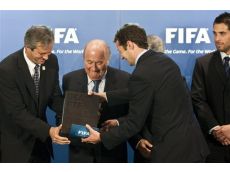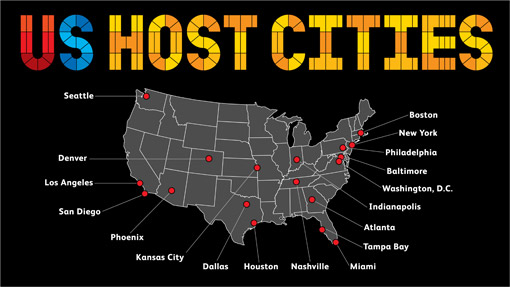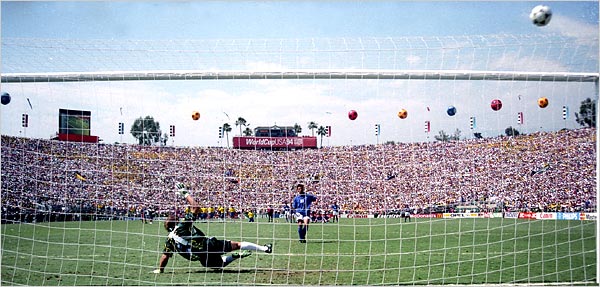By Andrew Warshaw
September 3 – The head of the United States’ bid to stage the World Cup has hinted the country may be prepared to leave the field in 2018 to Europe and concentrate only on the 2022 tournament.
But in an exclusive interview with insideworldfootball, bid chief executive David Downs said any decision on pulling out could be taken at the last possible moment before the vote on December 2.
The US are still technically in the running for both tournaments even though it is widely assumed the World Cup will come to Europe in 2018.
“There is no road map,” Downs told insideworldfootball.
“Nobody is instructing us to withdraw from 2018 but there may well come a time between now and December 2 where that situation changes.”
He would not be drawn on the idea that a canny vote-bartering strategy with other confederations might be going on behind the scenes.
 “There is no incentive to date for us to drop the 2018 part of our bid,” said Downs (pictured left handing over the Bid Book to FIFA President Sepp Blatter)
“There is no incentive to date for us to drop the 2018 part of our bid,” said Downs (pictured left handing over the Bid Book to FIFA President Sepp Blatter)
“If there is, we would consider it.
“This is a very dynamic process but at this point it’s pure speculation.”
Downs conceded the argument, however, that by bidding for both World Cups, there was a danger the US could end up with neither.
“If we assess that such a danger exists and presents a significant enough incentive to pull out of one or the other, would we do so?” he said.
“Absolutely.
“Don’t forget, however, there used to be a continental rotation in place.
“The next point in that rotation would have been CONCACAF and we are the sole CONCACAF representive.
“To suggest we should have made up our minds by now which one is more attractive, 2018 or 2022, is unfair.”
In a wide-ranging interview, Downs said flexibility of proposed cities and stadiums will be a key message when FIFA’s World Cup inspection team visits the US next week, the penultimate stop on its nine-candidate technical tour.
“One of the key aspects of the bid - and one we think will resonate with FIFA - is the abundance of facilities.

“We have submitted the maximum allowable 18 host cities and stadiums.
“This will obviously be narrowed down further if we are privileged enough to win but we will have multiple choices for hosting the opening and final match.”
Without referring specifically to South Africa, Downs added: “I say this in relation to recent experiences where FIFA perhaps has hosted the World Cup in a country that doesn’t necessarily have an abundance of facilities and would struggle if there were any last-minute issues.”
Downs believes the 1994 World Cup, while hardly putting soccer on the same level as traditional US sports like baseball or American football, generated significant long-term interest.
“It spawned a whole new generation of soccer fans in the United States,” he said.
“It put us on the path of becoming a soccer nation.
“One of the more fascinating statistics that came out of the World Cup in South Africa was that 112 million different Americans watched some portion of the television coverage.
“That’s an extraordinary large number and speaks volumes about how many people care about the sport in the USA.
“When I was a college soccer player in the 1970s, there was little coverage in the newspapers and it was tough to find a club.
“That has changed radically.
“It’s a different world.
Adidas has just signed a 10-year sponsorship deal with Major League Soccer (MLS).
“That’s a huge deal symbolically.
“Our contention is that if we can put on the World Cup eight or 12 years from now, the growth in the sport will be explosive.
“It would the missing ingredient from being a very strong sport to one of national mania.”
The toughest challenge, says Downs, is convincing a sceptical global public that the US would be the right choice.
 “The biggest problem we face is peoples’ perception that progress since since 1994 hasn’t been very significant.
“The biggest problem we face is peoples’ perception that progress since since 1994 hasn’t been very significant.
“To judge soccer’s presence in the United States only on the success of the MLS is unfair.
“We have tens of millions involved in the sport.
“I will concede that the MLS is not the equivalent of the top five or six soccer leagues in the world, or probably the NBA and NFL.
“But I genuinely believe that in my lifetime, soccer could end up being the number one sport in the United States.”
Contact the writer of this story at zib.l1744406424labto1744406424ofdlr1744406424owedi1744406424sni@w1744406424ahsra1744406424w.wer1744406424dna1744406424
Related stories
July 2010: US World Cup will lose billions, claims American report
July 2010: US will make decision about 2018 World Cup at “right time” claims Gulati
June 2010: Clinton admits US unpopularity abroad could damage World Cup bid
June 2010: Mihir Bose – USA deal could be crucial to England chances of getting 2018 World Cup

